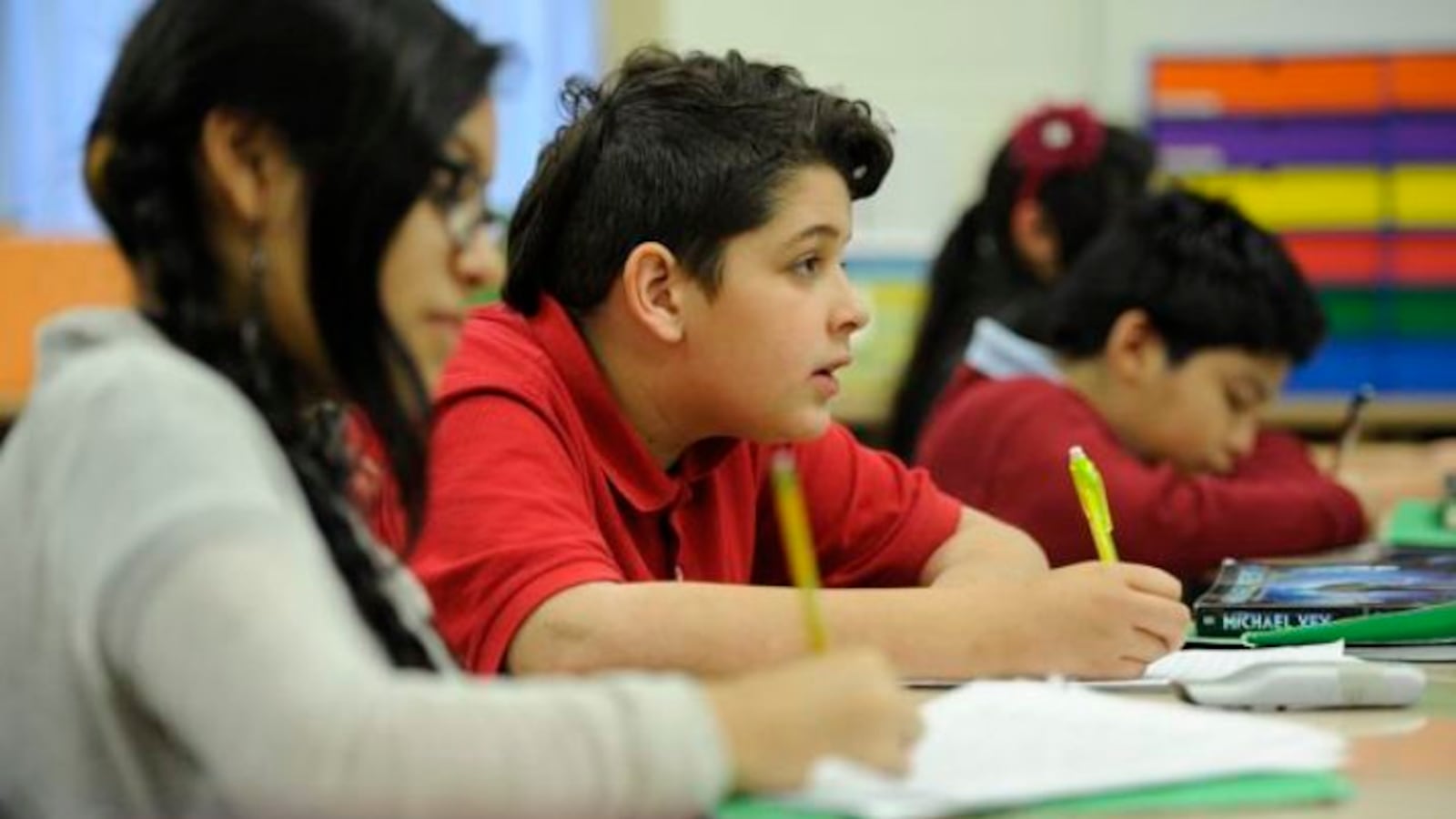When teachers across the city plop English exam packets onto students’ desks next week, kicking off the second season of Common Core testing, much will have changed since round one.
Some of the developments, including new Common Core teaching materials and a new schools chancellor committed to curbing test mania, have offered educators a modicum of calm before the exam books open. But other changes, particularly new teacher evaluations that factor in student test scores, make exam anxiety hard to shake.
“I hear a message of hope coming from the new administration,” said Megan Moskop, an English teacher at a Washington Heights middle school. “But the system still is what it is.”
Schools will administer the state’s annual grades three-to-eight English exams next Tuesday through Thursday. The math exams run from April 30 to May 2, after spring vacation.
For the second year, the tests are tied to the new Common Core learning standards, which in reading call for more nonfiction texts and closer textual analysis. Students’ scores on last year’s Common Core tests were much lower, on average, than their scores on the previous year’s exams, which were not tied to the new standards.
Having weathered those first tests, educators this year had a better sense of what to expect on the exams, several said.
Unlike last year, most schools this year also had new teaching materials that the city endorsed as Common Core-aligned. Many teachers received the materials late, and some found them uninspiring or unreasonably challenging. But others said they felt newly confident that the skills they taught in class would match those measured by the tests.
Lori Wheal, a sixth-grade English teacher at I.S. 131 in the Bronx, said the Scholastic-made materials her school chose and her own lessons center on Common Core skills, such as scrutinizing the way authors of persuasive texts construct arguments bit-by-bit with claims and evidence. To do this, they “close read” texts, scrutinizing and annotating passages over multiple re-readings. (The state’s English-exam guides say that on the test “100% of points require close reading.”)
“We’ve been doing pretty much the same skills and strategies they’re going to be tested on,” Wheal said.
But that state test-curriculum overlap concerns some teachers, who see their lessons bending toward the skills tested by the exams, even if they do not consider those skills as worthy as others.
Alex Messer, a fourth-grade at P.S. 321 in Park Slope who has spoken out about the impact of high-stakes exams, said anticipation of the tests have spurred line-by-line analyzing in some reading classes at the expense of vigorous discussions about big ideas.
“It’s looking at the trees instead of the forest,” Messer said.
The new schools chancellor, Carmen Fariña, had also “buoyed spirits a bit,” as one teacher put it. A longtime educator, Fariña has urged teachers not to obsess over the state exams, telling them the best test preparation is a lively classroom “where students are immersed in conversation, debating ideas, and developing perspectives.”
The new administration has also floated some test-related reforms, which it has yet to enact. For example, the city says it will deploy teams of experts to save struggling schools, where students perform poorly on tests, rather than close them. And Fariña has raised the possibility of removing test scores as a factor in student-promotion decisions.
But she has also pointed out that the federal government mandates annual student exams and state law now bases up to 40 percent of teachers’ ratings on students’ scores, leaving the city little leverage to reduce the amount of standardized testing. (In fact, the new teacher evaluations have added new tests for some students this year.)
“The law is the law is the law,” said Sameer Talati, principal of P.S. 7 in East Harlem. “You do feel the pressure.”
Tracy Lynne, an English teacher at an elementary school in Brownsville, Brooklyn with a history of low test scores, said some of her colleagues have responded to that pressure by pulling activities from test-prep booklets year round, not just in the weeks leading up to the exams.
Even at her children’s school in Brooklyn Heights, where students usually perform well on the exams, test prep has been ramped up this year, Lynne said. Where teachers used to hold voluntary workshops on test-taking strategies, now her son’s third-grade class is working through a new test-prep unit, she said.
Some teachers said the state’s decision to release only a quarter of last year’s test items, rather than publish the entire exams, has made it more difficult to prepare students for this year’s tests.
Others recalled the difficulty many students had completing the writing portions of last year’s English exams and wondered if the state had made adjustments. State officials said students will be given the same amount of time the reading tests this year (70 minutes per test day in grades three and four, and 90 minutes in grades five through eight). But they expect the older students to need less time because their tests will have fewer questions this year.
Some students with special needs will be allotted extra time. But several special-education teachers said that accommodation ignores that fact that the tests far exceed their students’ abilities.
“I don’t think any teacher ever wants to give a student a test we know is inappropriate,” said Moskop, the Washington Heights English teacher who has students with special needs. “In this case, we’re not given a choice.”
Anna Staab, a sixth-grade English teacher at the Highbridge Green School in the Bronx, said her approach to test season is to remind her students and herself to keep the exams in perspective.
“What we have our eyes on, the prize,” she said, “is so much bigger than the test.”
Want the latest in New York City education news? Follow Chalkbeat on Facebook or @ChalkbeatNY on Twitter.

